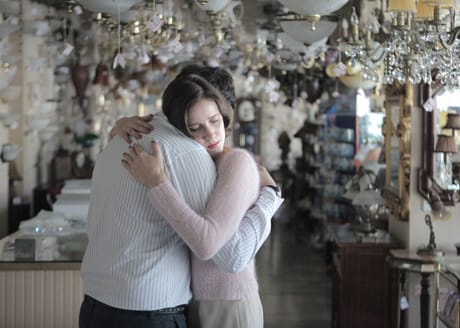With ALPS, Greek provocateur Giorgos Lanthimos has once again crafted an unsettling work of allegory, much like controversial 2009 totalitarian incest comedy Dogtooth. It similarly pivots on an unsustainable, insular ideology, or experiment, flawed from inception, not unlike the Greek economy prior to its inevitable implosion.
The distinction here is that rather than focusing on a family compound where a father shelters and deludes his children, hiding them from the world into adulthood, ALPS approaches the grieving process. It thrusts a group of lost souls (each deliberately devoid of complex characterization) into the world of clumsy re-enactments (a theme also present in Lanthimos' 2005 drama, Kinetta), where they pretend to be the recently deceased for loved ones unable to cope with their loss.
Led by a paramedic known only as Mont Blanc (Aris Servetalis), the notion of dictatorship as a regulating force in an inherently disastrous environment dominates, given his rigid enforcement of rules and structure regarding engaging the bereaved. In such, the actual re-enactments, shown mostly with the eventually dissident Monte Rosa (Aggeliki Papoulia), play out awkwardly, lacking any real emotion, exacerbating the banality of life's significant moments when taken out of context.
As significant as the story is, Lanthimos' method of storytelling jumps in and out of re-enactment scenarios, giving only brief glimpses at the lives of each character, which may, or may not, be real or performed. The perceived reality within the framed text or performance has the unspecified potential to be yet another re-enactment, only defined by deliberate ambiguity, leaving the audience conscious of their role adjacent to those hiring these loosely defined actors to play the dead.
Noting the superficial presence of actors in film, these empty vessels are defined only by the characters they portray to those watching, be it us, the viewer, or those grieving within the text of the movie. The conflict here stems from a performer unwilling to remain within the limitations of her character despite clear direction from her leader.
The question examined amidst the economic and mortal allegory is that of a passive role made aggressive should an actor refuse to break character or let you escape your tenuous, voyeuristic indulgence.
(Films We Like)The distinction here is that rather than focusing on a family compound where a father shelters and deludes his children, hiding them from the world into adulthood, ALPS approaches the grieving process. It thrusts a group of lost souls (each deliberately devoid of complex characterization) into the world of clumsy re-enactments (a theme also present in Lanthimos' 2005 drama, Kinetta), where they pretend to be the recently deceased for loved ones unable to cope with their loss.
Led by a paramedic known only as Mont Blanc (Aris Servetalis), the notion of dictatorship as a regulating force in an inherently disastrous environment dominates, given his rigid enforcement of rules and structure regarding engaging the bereaved. In such, the actual re-enactments, shown mostly with the eventually dissident Monte Rosa (Aggeliki Papoulia), play out awkwardly, lacking any real emotion, exacerbating the banality of life's significant moments when taken out of context.
As significant as the story is, Lanthimos' method of storytelling jumps in and out of re-enactment scenarios, giving only brief glimpses at the lives of each character, which may, or may not, be real or performed. The perceived reality within the framed text or performance has the unspecified potential to be yet another re-enactment, only defined by deliberate ambiguity, leaving the audience conscious of their role adjacent to those hiring these loosely defined actors to play the dead.
Noting the superficial presence of actors in film, these empty vessels are defined only by the characters they portray to those watching, be it us, the viewer, or those grieving within the text of the movie. The conflict here stems from a performer unwilling to remain within the limitations of her character despite clear direction from her leader.
The question examined amidst the economic and mortal allegory is that of a passive role made aggressive should an actor refuse to break character or let you escape your tenuous, voyeuristic indulgence.




